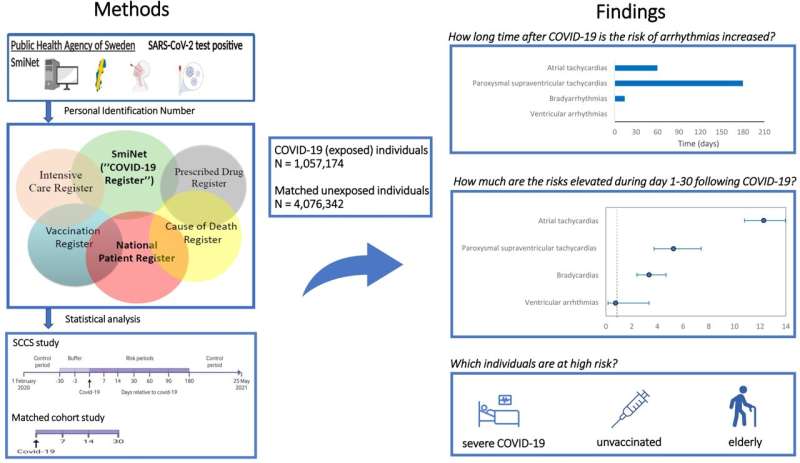This article has been reviewed according to Science X's editorial process and policies. Editors have highlighted the following attributes while ensuring the content's credibility:
fact-checked
trusted source
proofread
Large-scale study finds increased risk of heart rhythm disruption after COVID-19

Individuals infected with COVID-19 are also at an increased risk of suffering from heart rhythm disturbances, such as atrial fibrillation. This is shown in a new study published in European Heart Journal Open by researchers from Umeå University, Sweden, in one of the largest studies of its kind in the world.
"The results underline the importance of both being vaccinated against COVID-19 and that the health care system identifies people at increased risk of this type of complications, so that the correct diagnosis is made and appropriate treatment is started in time," says Ioannis Katsoularis, first author of the study and cardiologist at University Hospital of Northern Sweden in Umeå.
The researchers were able to show that those who had been ill with COVID-19 could also suffer from heart rhythm disturbances, both in the form of so-called tachycardias, when the heart rate is high, and bradyarrhythmias, when the heart is slow so that a pacemaker is sometimes needed.
The study shows that the risk of atrial fibrillation and flutter was increased up to two months after infection. In the first month, the risk was 12 times greater than for people who did not suffer from COVID-19 infection.
Even the risk of a specific subset of tachycardias, paroxysmal supraventricular tachycardia, was elevated up to six months after the infection and was five times greater in the first month. For the bradyarrhythmias, the risk was increased up to 14 days after the infection and was three times greater in the first month compared to subjects without COVID-19. Previous research in this area had not focused as much on which individuals are most at risk.
"We found that the risks were higher in older individuals, individuals with severe COVID-19 and during the first wave of the pandemic. We could also see that unvaccinated people were at higher risk than vaccinated people. Overall, the severity of the infection was the strongest risk factor," says Anne-Marie Fors Connolly, who leads the research group at Umeå University behind the study.
In the study, information from large national registers was cross-checked. All people who tested positive for the virus in Sweden from the start of the pandemic until May 2021 were included, as was a comparison group of individuals without a positive test for the virus.
More than 1 million individuals with COVID-19 and more than 4 million control individuals were included in this nationwide study, which is one of the largest of its kind in the world. Researchers at Umeå University have previously shown that COVID-19 leads to an increased risk of blood clots, myocardial infarction and stroke.
More information: Ioannis Katsoularis et al, Risk of arrhythmias following COVID-19: nationwide self-controlled case series and matched cohort study, European Heart Journal Open (2023). DOI: 10.1093/ehjopen/oead120


















